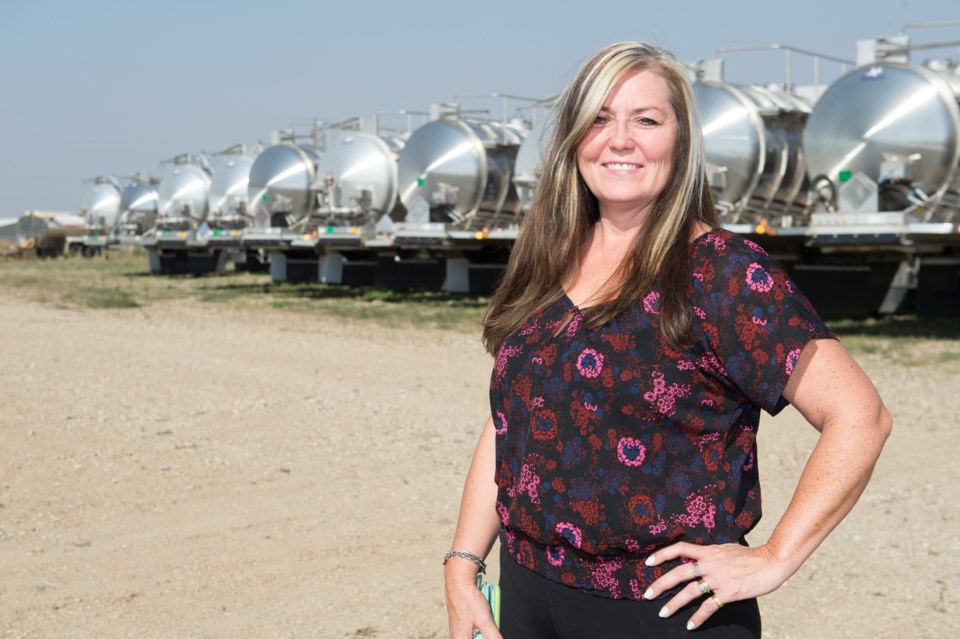Weyburn – With the downturn in oil prices, few companies have been buying new iron, and getting by with what they have. But the iron they do have that has kept working continues to put miles or hours on. At some point, a lot of equipment is going to need to be replaced.
That’s top of mind to Suzanna Nostadt, VP of operations for Tremcar West Inc., in Weyburn. They also have branches in Saskatoon and Edmonton.
Tremcar specializes in tank trailers, and in this region, in the oilpatch.
“With all the sales that have been going on, with people getting rid of trailers, those sales have slowed down. And people are actually looking at buying new trailers, which is unbelievable, because we haven’t seen that in three years,” Nostadt said on Sept. 7.
“There hasn’t been hardly any sales of new trailers. It’s been extremely slow. A lot of that was caused by the downturn in the oilpatch, crude prices dropping. It was all types of units, basically.”
While she’s seen some customers keep well-maintained trailers for 32 years or more, but that’s not typical. “Most of the time, when they buy a new trailer, they usually keep it for as long as they have work. And when they don’t use it, they usually wind up selling it. It’s usually a turnover of 10 to 15 years, when they trade up, or there’s newer or better trailers, similar to a vehicle.” she said.
Major overhauls, like replacing the sump and fittings, is dependent on what they haul, and their maintenance. “If they’re hauling very caustic stuff, and they don’t rinse them out, or how they store it, will affect the longevity of their trailer. Also, preventative maintenance helps.”
Visual and leakage tests are required by Transport Canada yearly. Every five years, an internal test and pressure test are required.
“There’s still people working. They complain lots about the rates, but they’re still working. They’re still wearing their trailers out. Even if they’re sitting, they’re still wearing their trailers out to a certain extent, because seals are drying up and stuff isn’t moving,” she said.
Nostadt thinks there is a pent up demand for new trailers. There seems to be a real push to go to stainless steel tanks, for instance. Stainless steel is heavier and more durable than aluminum tanks, but aluminum is lighter and can carry a higher payload. However, you have a lining to contend with.
Asked if there’s a magic number for oil prices to see activity pick up, she responded, “I think our customers eventually cannot afford to sit there and let their units sit. They get them ready in anticipation they’re going to need those units. That kind of activity is based on optimism in the oilpatch and the whole economy. I think it sometimes becomes a self-fulfilling prophesy, because they’re going to create business. They’re going to fix up their units and start using them and actively going out to get work so they can go out and use their trailer. A lot of them will do their yearly maintenance on them so that in the event they need them, they’re ready to go. They don’t have to wait to get them in a shop to get the work done.”
“It can’t continue this way for another three years, because that would be devastating.
‚ÄúIn the last three months, we‚Äôve seen a real influx of activity and repairs –°¿∂ ”∆µ done; purchasing of new units. We haven‚Äôt seen that,‚Äù she said, noting customers are now fixing units they wouldn‚Äôt have thought of three months prior. ‚ÄúThere must be something happening.‚Äù
“Sales of new iron is picking up. Customers are more confident of purchasing new trailers now, fixing trailers. They’re willing to spend money now.”
It’s not just the big companies, but rather across the board, she noted, saying, “There seems to be a lot more optimism than there was before. I’m hoping we’re at a turning point, here.”
“They’re starting to open the purse up and spend money,” Nostadt said.
“I really think the market is turning. I really think we’re turning in the right direction. Let’s hope, anyway,” she concluded.




